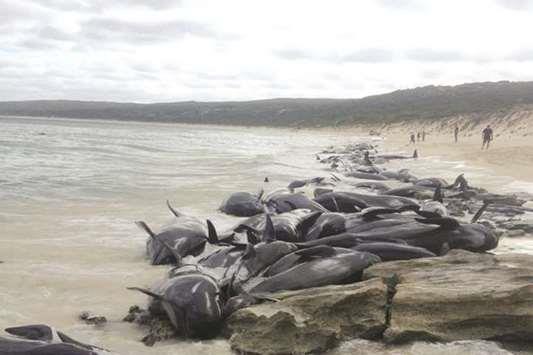
403
Sorry!!
Error! We're sorry, but the page you were looking for doesn't exist.
Authorities struggle to rescue beached whales in Australia
(MENAFN- Gulf Times) Authorities were struggling to save the 15 survivors from a group of more than 150 whales that got beached in south-western Australia yesterday. The group of mostly short-finned pilot whales were stranded at Hamelin Bay in Augusta, 315km south of Perth, sparking the closure of all beaches in the area, as well as a shark alert.
'Unfortunately, most of the whales beached themselves on dry land overnight and have not survived, Jeremy Chick, an incident controller with the Department of Fisheries, said. The surviving whales were in shallow water and authorities planned to herd them out deeper by late afternoon.
'Rescue operations will be hampered by deteriorating weather conditions and we need to ensure the safety of everyone involved before we move the whales, Chick said.
The shark alert was issued due to multiple whale carcasses, a statement by the government of Western Australia said. 'It is possible the dead and dying animals will act as an attractant, which could lead to sharks coming close into shore along this stretch of coast, it said. The carcasses were being removed from the beach and wildlife authorities were taking DNA samples in an attempt to collect clues about why the whales beached.
Adult pilot whales are about 5m-long and weigh up to three tonnes. They are found in most waters across the world. The whales were spotted by a commercial fisherman early yesterday. 'As we've left the anchorage we've seen four or five whales. I believe there's more on the beaches, fisherman Graham Pateman, who alerted the authorities, told Australian broadcaster ABC.
'We were just going to pull our pots. We're not far (from the beach). We're just half a mile off the beach, Pateman said.
Scientists do not know why mass beachings take place.
Rebecca Wellard, a whale researcher at Curtin University in Sydney, says that mass strandings almost invariably involve oceanic species of cetaceans — whales, dolphins and porpoises — and that long-finned and short-finned pilot whales tend to be the most frequent casualties.
'Their highly social nature and strong familial bonds could explain why this species is amongst those cetaceans that most frequently mass-strand— where when one whale becomes stranded the others tend to follow, she said.
'They are highly vocal and have complex acoustic signalling within the social group.
In 2009, more than 80 pilot whales and dolphins died in a mass stranding at Hamelin Bay, but the largest mass stranding in Australia was in 1996 in Dunsborough when 320 long-finned pilot whales were beached.
'A ‘high risk area' where the physical contour of the environment, may be the cause of repeated strandings. For example large tidal range and shallow waters can leave animals stuck in shallow receding water, Wellard said.
'Unfortunately, most of the whales beached themselves on dry land overnight and have not survived, Jeremy Chick, an incident controller with the Department of Fisheries, said. The surviving whales were in shallow water and authorities planned to herd them out deeper by late afternoon.
'Rescue operations will be hampered by deteriorating weather conditions and we need to ensure the safety of everyone involved before we move the whales, Chick said.
The shark alert was issued due to multiple whale carcasses, a statement by the government of Western Australia said. 'It is possible the dead and dying animals will act as an attractant, which could lead to sharks coming close into shore along this stretch of coast, it said. The carcasses were being removed from the beach and wildlife authorities were taking DNA samples in an attempt to collect clues about why the whales beached.
Adult pilot whales are about 5m-long and weigh up to three tonnes. They are found in most waters across the world. The whales were spotted by a commercial fisherman early yesterday. 'As we've left the anchorage we've seen four or five whales. I believe there's more on the beaches, fisherman Graham Pateman, who alerted the authorities, told Australian broadcaster ABC.
'We were just going to pull our pots. We're not far (from the beach). We're just half a mile off the beach, Pateman said.
Scientists do not know why mass beachings take place.
Rebecca Wellard, a whale researcher at Curtin University in Sydney, says that mass strandings almost invariably involve oceanic species of cetaceans — whales, dolphins and porpoises — and that long-finned and short-finned pilot whales tend to be the most frequent casualties.
'Their highly social nature and strong familial bonds could explain why this species is amongst those cetaceans that most frequently mass-strand— where when one whale becomes stranded the others tend to follow, she said.
'They are highly vocal and have complex acoustic signalling within the social group.
In 2009, more than 80 pilot whales and dolphins died in a mass stranding at Hamelin Bay, but the largest mass stranding in Australia was in 1996 in Dunsborough when 320 long-finned pilot whales were beached.
'A ‘high risk area' where the physical contour of the environment, may be the cause of repeated strandings. For example large tidal range and shallow waters can leave animals stuck in shallow receding water, Wellard said.

Legal Disclaimer:
MENAFN provides the
information “as is” without warranty of any kind. We do not accept
any responsibility or liability for the accuracy, content, images,
videos, licenses, completeness, legality, or reliability of the information
contained in this article. If you have any complaints or copyright
issues related to this article, kindly contact the provider above.


















Comments
No comment